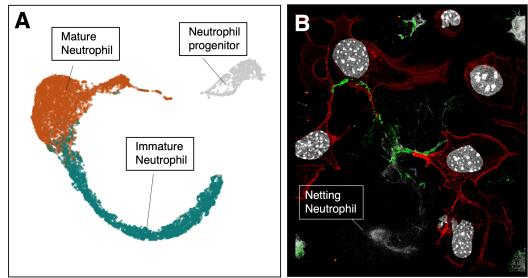Prof. Dr. Carlos Silvestre-Roig
No positions via CiM-IMPRS in 2026
Fundaments of the origin, mechanisms, and functional consequences of neutrophil heterogeneity

Immunology
Inflammation
Vascular Biology/Angiogenesis
Neutrophil biology
The traditional perception of neutrophils as a short-lived homogenous population with antimicrobial properties and limited transcriptional activity has been challenged by accumulating evidence over the last decade. Neutrophil functional ‘states’ are described in homeostasis and disease and illustrate previously unknown functional plasticity. Yet, the origin of such neutrophil diversification and the physiological and pathological consequences of it remain to be clarified.
Our research focus is centered on understanding the origin, mechanisms, and consequences of neutrophil functional diversity in the context of acute and chronic vascular inflammatory diseases. The line of research is founded on the identification of cellular (ontogeny, maturation) and molecular (microbial, metabolic) mediators contributing to neutrophil heterogeneity and the understanding of its significance in the context of inflammation. Importantly, attempts to therapeutically target neutrophil-driven pathologies using depletion or blocking recruitment strategies have failed to be translated into the clinic, in part due to the secondary impact on their antimicrobial functions. Here, understanding neutrophil heterogeneity might be exploited to design refined therapeutic strategies to specifically target pathogenic subpopulations to prevent neutrophil-driven immunopathologies without altering host defense. To achieve these goals, we employ state-of-the-art techniques including spectral flow cytometry, multiplexed immunofluorescence, in vivo imaging, or single-cell epigenomics.

Vita
-
09/2001 - 09/2006 Biology, Universidad de Valencia, Valencia, Spain
-
12/2009 Master’s degree. Universidad de Valencia, Spain
-
09/2007 - 01/2013 PhD student, Inst Biomedicina de Valencia, CSIC, Valencia (Spain) and
Spanish National Cardiovascular Research Center (CNIC), Madrid (Spain) -
02/2013 - 10/2015 Postdoc, University of Amsterdam, The Netherlands
-
11/2015 - 02/2021 Postdoc, Institute for Cardiovascular Prevention (IPEK), LMU Munich
-
03/2021 – 02/2022 Group leader, Institute of Experimental Pathology, University of Münster
-
03/2022- Present Professor for Vascular Immunology, Institute of Experimental Pathology,
University of Münster
Selected references
Hidalgo A, Libby P, Soehnlein O, Aramburu IV, Papayannopoulos V, Silvestre-Roig C. (2022). Neutrophil extracellular traps: from physiology to pathology. Cardiovasc Res. Oct 21;118(13):2737-2753
Silvestre-Roig C, Lemnitzer P., Gall J., Schwager S., Toska A., Yvan-Charvet L., Detmar M., Soehnlein O. (2021). Arterial Delivery of VEGF-C Stabilizes Atherosclerotic Lesions. Circ Res. Jan 22;128(2):284-286.
Silvestre-Roig C*, Fridlender Z.G*., Glogauer M, and Scapini P. (2019). Neutrophil diversity in health and disease. Trends Immunology. Jul;40(7):565-583. * equal contribution
Silvestre-Roig C*, Braster Q*, Wichapong K, Lee EY, Teulon JM, Berrebeh J, Winter J, Froese A, Adrover JM, Santiago Santos G, Froese A, Lemnitzer P, Ortega-Gómez A, Chevre C, Marschner J, Schumski A, Winter C, Perez-olivares L, Pan C, Paulin N, Schoufour T, Hartwig H, González Ramos S, Kamp F, Megens RTA, Mowen KA, Gunzer M, Maegdefessel L, Hackeng T, Lutgens E, Daemen M, von Blume J, Anders HJ, Nikolaev VO, Pellequer JL, Weber C, Hidalgo A, Nicolaes G, Wong GCL, Soehnlein O. Externalized histone H4 orchestrates chronic inflammation by inducing lytic cell death. (2019). Nature. May;569(7755):236-240. * equal contribution
Silvestre-Roig C, Hidalgo A, Soehnlein O. Neutrophil heterogeneity: implications for homeostasis and pathogenesis. (2016). Blood. May 5;127(18):2173-81.
